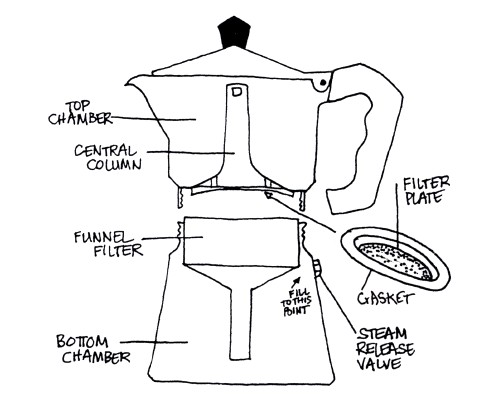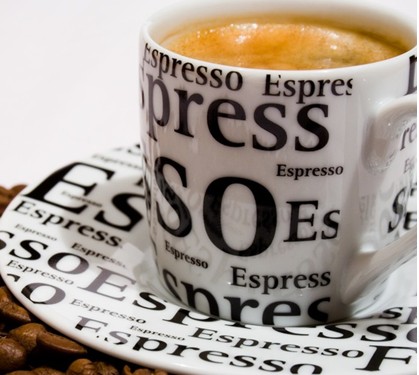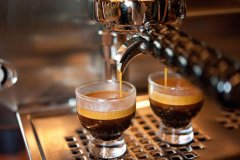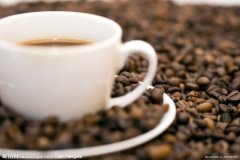How to judge the quality of Espresso coffee? how to judge the quality of a cup of coffee?
Caffeine content of Espresso
In addition to its unparalleled aroma, consistency and rhyme, Espresso coffee has one of its biggest features: low caffeine. When some people drink Esprsso coffee for the first time, they have the illusion that such strong and pure coffee must have a high caffeine content. In fact, on the contrary, of all the coffee-making methods, coffee is made with the same beans, and the coffee made by the Espresso machine contains the least caffeine. Because the caffeine in coffee is a water-soluble substance, the longer the coffee powder is in contact with water, the more caffeine is dissolved, while the brewing time of Espresso coffee is only more than 20 seconds. When the caffeine is not released, a cup of mellow coffee has already been brewed, so the caffeine content is only 1max, 3mer, 1max, which is generally used in other brewing methods.
What is Espresso?
The high-pressure and fast brewing method of coffee is called "Espresso", that is, Espresso originally refers to a method of brewing coffee, and later the coffee brewed in this way is also called Espresso. A perfect cup of Espresso coffee is made by 7-8 grams of roasted coffee beans, ground into a very fine powdered coffee, after proper filling (20Kg), with 9 plus or minus 1 atmospheric pressure and 90 degrees plus or minus 2 degrees hot water, the 30CC coffee concentrate is extracted in 2530 seconds.

How to judge a good Espresso
People like to drink coffee because it releases flavor and aroma when it is brewed. The sources of flavor in coffee are mostly water-soluble, such as caffeine, protein, sugar and so on, while the sources of aroma are mostly insoluble, such as coffee oil. The volatile aroma of coffee oil is found in roasted coffee cells. Some of these oils are insoluble in water and only emulsify 10% when using an Espresso machine at high temperature and high pressure and float in the hot coffee juice, turning into a rich ochre red Crema. We can judge the quality of a cup of Espresso by the color, thickness, markings and other appearance of Krima.
The thickness and rhyme of Espresso
Espresso coffee tastes particularly thick, and its consistency comes from the fact that when the water flows through the coffee powder to the cup, the carbon dioxide bubbles are suspended in the coffee juice liquid and mixed with an emulsified gel. These gelatinous substances inhibit the taste buds' sense of bitterness, making us feel particularly fragrant and strong when drinking Espresso coffee, but not too bitter. These mixed colloidal substances and emulsified oils become tiny droplets and are responsible for the so-called "rhyme", that is, by reducing the surface tension of the liquid. At the same time, the gel makes the tiny oil droplets penetrate the taste buds deeper, making the oil stay, and then slowly release the aromatic substances attached to it. This aroma can let the olfactory senses know the aroma and throat rhyme for up to 20 minutes after drinking Espresso coffee.

Important Notice :
前街咖啡 FrontStreet Coffee has moved to new addredd:
FrontStreet Coffee Address: 315,Donghua East Road,GuangZhou
Tel:020 38364473
- Prev

How to choose fresh coffee beans freshness is the life of coffee
Freshness is the life of coffee, how to determine the freshness of coffee beans? There are three steps: smell, see, and peel. Smell: put the coffee beans close to the nose and smell them deeply to see if you can clearly smell the aroma of the coffee beans. If so, the coffee beans are fresh enough. On the contrary, if the aroma is weak, or the greasy smell has begun to appear, it means that the coffee beans are completely stale.
- Next

Recycling ways of coffee grounds for coffee powder after extraction
I always like to make my own coffee, but always throw the remaining coffee powder after brewing and extraction into the dustbin. Recently, the economic situation is not good, Xiao Ke is also trying to wonder if coffee powder can also have some surplus value for me to extract. After I have tried many things, I have summed up the following major functions: 1. Remove odor function. This will dry the boiled coffee powder in the sun and install it.
Related
- Detailed explanation of Jadeite planting Land in Panamanian Jadeite Manor introduction to the grading system of Jadeite competitive bidding, Red bid, Green bid and Rose Summer
- Story of Coffee planting in Brenka region of Costa Rica Stonehenge Manor anaerobic heavy honey treatment of flavor mouth
- What's on the barrel of Blue Mountain Coffee beans?
- Can American coffee also pull flowers? How to use hot American style to pull out a good-looking pattern?
- Can you make a cold extract with coffee beans? What is the right proportion for cold-extracted coffee formula?
- Indonesian PWN Gold Mandrine Coffee Origin Features Flavor How to Chong? Mandolin coffee is American.
- A brief introduction to the flavor characteristics of Brazilian yellow bourbon coffee beans
- What is the effect of different water quality on the flavor of cold-extracted coffee? What kind of water is best for brewing coffee?
- Why do you think of Rose Summer whenever you mention Panamanian coffee?
- Introduction to the characteristics of authentic blue mountain coffee bean producing areas? What is the CIB Coffee Authority in Jamaica?

